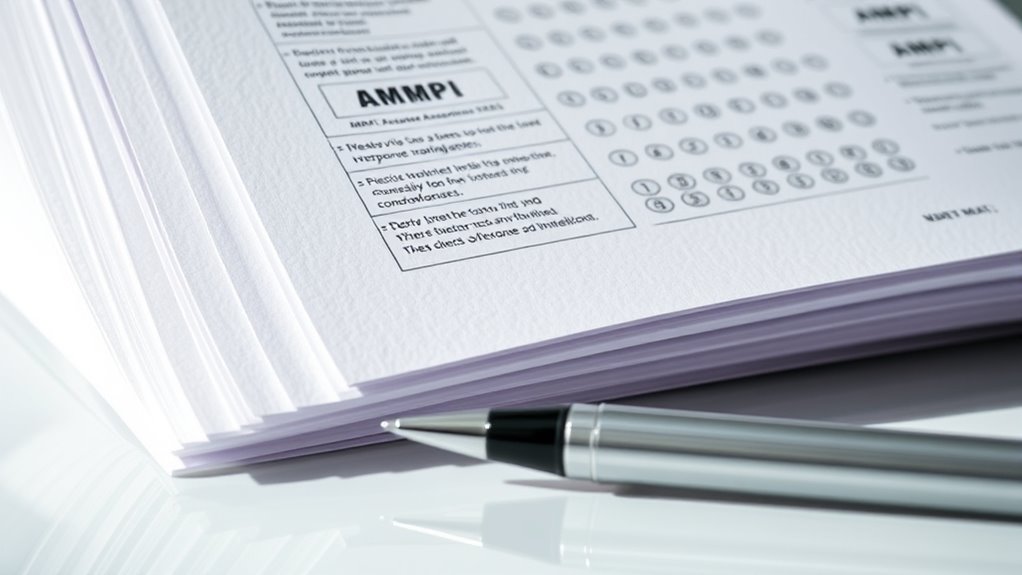The psychometric properties of the MMPI include its strong validity and reliability, making it a trusted tool for evaluating mental health and personality traits. It accurately measures a broad range of symptoms and traits when response patterns are genuine. However, response biases and cultural differences can affect its effectiveness. Proper interpretation depends on analyzing validity scales to detect distortions. If you explore further, you’ll discover how these factors impact the MMPI’s overall accuracy and application.
Key Takeaways
- The MMPI demonstrates high reliability and validity in measuring diverse clinical symptoms and personality traits.
- Validity scales assess response biases, ensuring the accuracy of test interpretations.
- Cultural adaptations and normative data are essential for accurate assessments across diverse populations.
- Response biases and validity concerns can compromise the test’s psychometric integrity if not properly managed.
- Remote collaboration tools enhance data analysis, interpretation, and overall assessment accuracy in various settings.

The Minnesota Multiphasic Personality Inventory (MMPI) is one of the most widely used psychological assessment tools, valued for its ability to measure a broad range of clinical symptoms and personality traits. Its widespread application in clinical, forensic, and research settings highlights its importance, but it’s crucial to understand the factors that influence its effectiveness. Validity concerns are at the forefront, as they determine whether the test accurately measures what it claims to assess. You need to be aware that responses can sometimes be biased, either intentionally or unintentionally, which can compromise the test’s validity. For example, individuals might respond in a way they believe will present them favorably or hide problematic traits, leading to distorted results. To counteract this, the MMPI includes validity scales designed to detect such response patterns, but no tool is perfect. A thorough interpretation requires considering these validity indicators carefully to avoid misdiagnosis or inaccurate conclusions. Additionally, remote collaboration tools used in virtual environments can facilitate the analysis and interpretation of complex psychometric data, especially when working with diverse or geographically dispersed teams.
Cultural considerations also play a critical role in the MMPI’s psychometric properties. Since the test was primarily developed based on Western populations, you should be cautious when applying it across diverse cultural groups. Cultural differences can influence how individuals interpret and respond to certain items, which may not always align with the test’s original norms. For instance, some questions might be culturally sensitive or have different connotations, potentially affecting the validity of results. If you overlook these cultural nuances, you risk misinterpreting a person’s responses, which can lead to inappropriate diagnoses or treatment plans. To improve accuracy, researchers have developed culturally adapted versions of the MMPI or incorporated normative data from varied populations. Still, it’s important to remember that cultural considerations are ongoing concerns that require continuous evaluation and adjustment.
Frequently Asked Questions
How Does the MMPI Compare to Other Psychological Assessments?
You’ll find that the MMPI stands out because it offers strong test reliability and extensive research backing its validity. Compared to other assessments, it provides thorough insights into personality and mental health. Its cultural validity is continually refined, making it more accurate across diverse populations. While some tests may focus on specific areas, the MMPI’s broad scope and proven reliability make it a preferred choice for clinicians evaluating psychological conditions across different cultural contexts.
What Cultures Is the MMPI Validated For?
You should know that the MMPI has been thoughtfully adapted for several cultures, including Spanish-speaking populations and some Asian groups, supporting its cross-cultural validity. Its cultural adaptation guarantees it resonates well across diverse backgrounds, but you should remain cautious about its universal applicability. While it demonstrates strong cross-cultural validity in these groups, ongoing research continues to enhance its effectiveness worldwide, ensuring it remains a valuable tool for varied cultural contexts.
Can the MMPI Diagnose Specific Mental Disorders?
The MMPI can’t provide a definitive clinical diagnosis of specific mental disorders. Instead, it offers valuable insights to support clinical diagnosis, highlighting patterns of symptoms and personality traits. You should remember its diagnostic limitations—it’s a screening tool, not a standalone diagnostic instrument. Use it alongside thorough clinical assessments to guarantee an accurate understanding, as it helps guide but doesn’t replace professional judgment in diagnosing mental health conditions.
How Often Should the MMPI Be Re-Administered?
You should re-administer the MMPI based on the need for updated assessment, typically every 1 to 2 years, depending on circumstances. Focus on test retest reliability, which indicates stability over time. Frequent assessment guarantees you capture changes in mental health status, but avoid unnecessary retakes that might influence results. Align assessment frequency with clinical or research goals to maintain accurate, reliable data.
Are There Digital Versions of the MMPI Available?
Think of the MMPI as a classic book now available in a sleek digital format. Yes, there are digital versions of the MMPI, designed for online administration. These digital formats streamline the testing process, making it more accessible and efficient. You can complete the assessment from your device, ensuring convenience without sacrificing accuracy. This evolution helps clinicians interpret results faster, just like upgrading from paper maps to GPS for smoother navigation.
Conclusion
Understanding the psychometric properties of the MMPI is like unlocking a trusted map, guiding you through the complex landscape of personality assessment. Its reliability and validity serve as sturdy landmarks, ensuring your journey is accurate and meaningful. With solid evidence backing its use, the MMPI stands as a beacon of trust in psychological evaluation, illuminating the path toward insightful understanding. Trust in its proven properties, and let it be your compass in steering human complexity.









